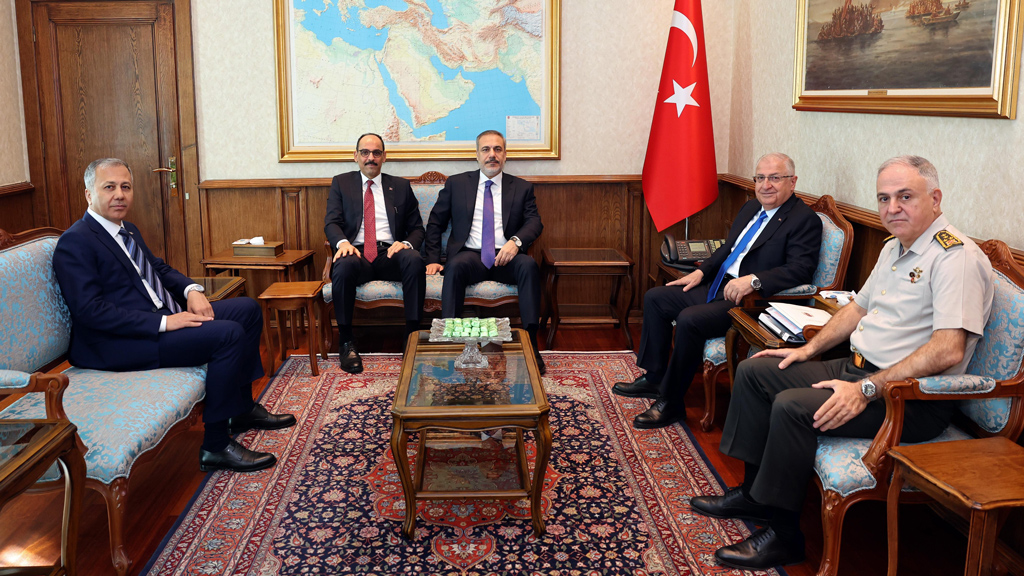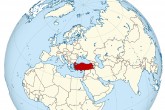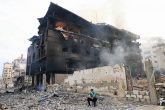Türkiye carried out airstrikes in Syria and Iraq last week in response to a terrorist attack against the Interior Ministry in Ankara. During that period, one statement and one picture attracted plenty of attention.
The statement in question was made by Foreign Minister Hakan Fidan, who warned that the country would treat “all PKK-YPG infrastructure, superstructure and energy facilities in Iraq and Syria” as “legitimate targets.” He also warned “third parties” to avoid PKK/YPG facilities and operatives – a stern warning with many technical terms.
The photograph, in turn, was taken at a meeting at the Ministry of Defense, featuring Foreign Minister Fidan, National Defense Minister Yaşar Güler, Interior Minister Ali Yerlikaya, Intelligence Chief Ibrahim Kalın and Military Chief of Staff Metin Gürak. Experts interpreted that image as Ankara reiterating its commitment to fighting PKK/YPG terrorists.
The downing of a Turkish armed drone by a U.S. fighter jet fueled concerns over the Türkiye-U.S. relations and the future of Turkish operations in Syria and Iraq. Following a phone call, the two defense ministers highlighted the importance of “close coordination” between Turkish and U.S. forces during military operations in the relevant area.
On Saturday, the Turkish Foreign Ministry issued a written statement to announce that Türkiye had lost an armed drone due to “different technical assessments in the deconfliction mechanism with third parties.” It noted that “necessary measures are being taken to ensure a more effective operation of the deconfliction mechanism with the relevant parties.”
Perhaps more importantly, the ministry stressed that “this incident in no way affected the execution of the ongoing operations and the striking of identified targets” and reiterated Ankara’s commitment to eliminate “all capabilities and sources of income developed by the terrorist organization in Syria.”
I make sense of the latest developments in the following manner:
– Türkiye will continue to insist on fighting elements of the PKK terrorist group and its Syrian wing YPG in Iraq and Syria.
– Attempts by U.S. military officers, who work with YPG elements in Syria, to create faits accomplis remains a serious risk and it is critically important for Ankara and Washington to coordinate their actions.
– In light of the terrorist attack in Ankara, which two PKK operatives carried out upon arrival from Syria, the Biden administration needs to start paying attention to the Syria-YPG file.
– The U.S. argument that Washington supports the YPG in the name of fighting Daesh means absolutely nothing in Türkiye and arguably remains the driving force behind anti-American sentiment.
– The YPG is a component of PKK, which the relevant U.S. officials and experts know perfectly well.
– The U.S. argument that the withdrawal of American forces from Syria would hand over the YPG to Russia and Iran, too, is unconvincing. Türkiye expects the United States, its ally, to work together on fighting PKK/YPG – just as they fought Daesh.
Let me repeat that whether YPG operatives in Syria hoist the Star-Spangled Banner will not impact Ankara’s determination to combat terrorism.
Most importantly, Washington’s unsustainable YPG policy needs to be overhauled in cooperation with Ankara.
This critical issue cannot be left to the mercy of the emotional knee-jerk reaction of United States Central Command (CENTCOM) officials.
The most recent reaction from Turkish officials suggests that the country expects a “rational negotiation” with Washington yet remains committed to its comprehensive and preventive security policy in Syria and Iraq.
The image of the five above-mentioned senior officials attests to Türkiye’s determination as well as the high level of internal coordination and unity.
In the wake of the most recent PKK terrorist attack in Ankara, it is extremely important for political parties to (continue to) support Turkish counter-terror operations in Syria and Iraq.
The Turkish government requested Parliament authorize military deployments to Iraq and Syria for an additional two years. The domestic political debate will be shaped by the response of various parties to that request.
Let us recall that the Republican People’s Party (CHP) voted against a similar request ahead of the May 2023 elections in a seeming attempt to join forces with the Peoples’ Democratic Party (HDP) and the Green Left Party (YSP) – a break with the main opposition party’s traditional view.
Currently dealing with a leadership struggle and scheduled to hold a party congress soon, it remains unclear which way the CHP will go this time around.
Ahead of next year’s municipal elections, the main opposition party needs support from the YSP as well as the Good Party – which makes the above decision particularly tough. Specifically, the CHP might drive the Good Party further away if it chooses to oppose the military authorization bill.
In this article
- Opinion
- Ali Yerlikaya
- Biden Administration
- DAESH
- Fight against PKK
- Fight Against Terror
- Ibrahim Kalın
- Iraq
- Kurdistan Workers' Party Terrorist Organization (PKK)
- MIT Metin Gürak
- People's Protection Units (YPG)
- PKK - YPG - SDF - PYD - YPJ - SDG - HBDH - HPG - KCK - PJAK - TAK - YBŞ
- Russia
- Syria
- Turkish Defense Minister
- Türkiye
- Türkiye's Green Left Party (YSP)
- Türkiye's Peoples' Democratic Party (HDP)
- Türkiye's Republican People's Party (CHP)
- United States (US)
- Yaşar Güler



